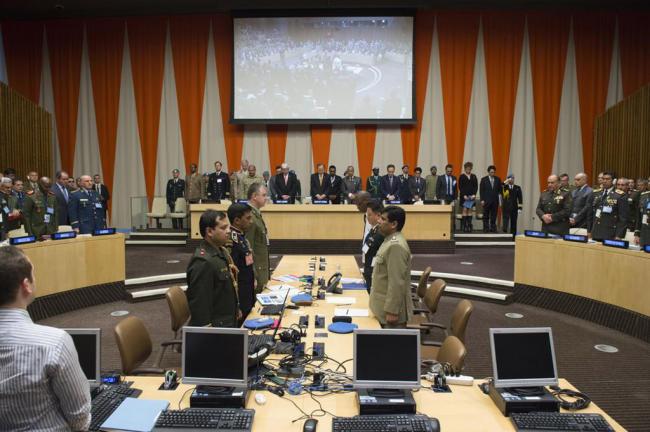"We need unity and backing,” said Ban.
He added, “Effective performance demands broad consensus on why, where and how peacekeepers carry out their mandates.”
The historic event brings together chiefs of defence and senior military officials from more than 100 Member States to discuss issues central to UN Peacekeeping as part of a wider process of engagement by the UN with Member States to expand the peacekeeping partnership and promote effective and efficient implementation of mandates.
Held in the ECOSOC Chamber, the conference continues throughout today, with Under-Secretary-General for Peacekeeping Operations, Hervé Ladsous, and Atul Khare, Under-Secretary-General for Field Support, also speaking.
Ban told the gathered soldiers that threats to peacekeepers were on the rise, with more deaths year-on-year now than ever before.
He said, “Before 2000, there were four times when more than 100 peacekeepers lost their lives in a single year. Since then, we have suffered that tragic toll ten times. Consecutively, 10 times.”
After a moment of silence was marked for fallen peacekeepers, Ban went on to stress the dangers faced by UN peacekeepers as they protect innocent lives “on the front lines of human misery” in some of the world's most dangerous places.
“Over the past two decades, the Security Council has given peacekeepers increasingly challenging mandates,” he said, pointing to Mali and Central African Republic.
He added, “Even in traditionally static missions, such as UNDOF, in the Golan Heights, there can be sudden changes in the operating environment.”
The role of peacekeeping was first and foremost to protect civilians from violence, he said, adding that they also helped with stabilisation, the extension of state authority, strengthening of the rule of law, addressing gender equality and protecting human rights.
“With such diverse responsibilities, peacekeepers can bring comprehensive stability – when they have the right capabilities and political will to succeed,” Ban said.
He added, “The needs are rising – but the resources fall short. I have appointed a High-Level Independent Panel to address the serious difficulties we face.”
In a dangerously complex global security landscape, marked by terrorism, organized crime, civil conflicts and even health crises, peacekeepers were being given increasingly challenging mandates by the Security Council.
More than 130,000 military, police and civilian staff from around the world today serve in the UN's 16 peacekeeping operations. He said peacekeepers should be able to rapidly deploy into active conflicts that may escalate at any moment, with capacity to move peacekeepers quickly and safely to where they are most needed, and with intelligence capabilities and other support to enable them to fulfil their mandates
“This is our largest deployment in history. It must be matched by a stronger international partnership for peacekeeping,” he said.
He added, “Peacekeeping is a shared global responsibility that advances the world's common interests.”
Closing the Conference, the Deputy Secretary-General, Jan Eliasson, said that peacekeeping operations remain one of the Security Council's most substantive and dynamic tools to respond to conflict and post-conflict situations.
“When peacekeeping missions are deployed in post-conflict situations, countries are 50 per cent less likely to experience renewed conflict,” he said.
He added, “This saves lives, protects infrastructure and fosters development.”
He pointed to the UN's efforts to adapt its approach to peacekeeping in the face of evolving demands through the Peace Operations Review, which Eliasson said was expected to provide appropriate options and concepts for the future but he added that peacekeeping had a “timeless purpose” at its heart.
He talked of the role played by peacekeeping missions in promoting successful transition to sustainable peace and inclusive governance, and to protecting civilians. He also drew attention to the “new and diverse ways” in which peacekeepers were being deployed in different contexts.
“The Security Council's high expectations and great demands testify to its faith in peacekeeping as a tool for maintaining international peace and security,” he said.
He added, “We hope we will also be given the necessary resources to meet these demands.”
He called on the gathered military officers to provide the capabilities needed to fulfil peacekeeping mandates, to unite politically behind peacekeeping missions and to continue working towards a common understanding of peacekeeping and to build support for it.
“We hope that your Governments will continue to engage actively in this renewed international dialogue on peacekeeping,” he said.
He added, "The risks in peacekeeping will always be high. The stakes are life-and-death. When we succeed, we prove to the world's most vulnerable people that, fundamentally, the most powerful soldiers are those without enemies. We show that true strength is built on universal values laid down in the UN Charter.”
Photo: UN Photo/Eskinder Debebe
